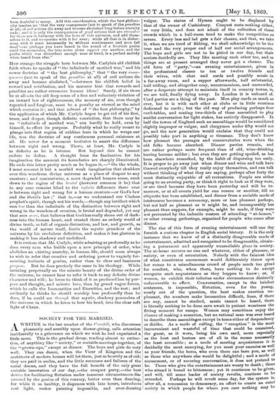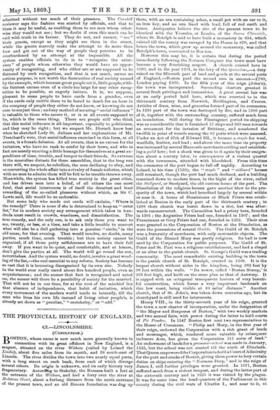SOCIETY FOR THE MARRIED.
AWRITER in the last number of the eornhill, who discourses pleasantly and sensibly upon dinner-giving, calls attention incidentally to a grievance on which we wish he had expatiated a little more. This is the gradual decay, tending almost to extinction, of anything like "society," or sociable meetings-together, of the "grown-ups," except at dinner. The boys and girls do very well. They can dance, when the Vicar of Kingston and the architects of modern houses will let them, just as heartily as of old; they are paid in smiles, and the little successes and failures of the social drama, and they have the full benefit of the only great sociable innovation of our day,—the croquet party,—the best device for facilitating flirtation under innocent circumstances discovered by the genius of this century, better even than dancing, I for while it as healthy, it dispenses with late hours, introduces real light, makes painting impossible, and over-dressing
vulgar. The statue of Hymen ought to be displaced by. that of the owner of Cashiobury. Croquet costs nothing either, or very little, and does not admit of the collection of those crowds which in a ball-room tend to make the competition so severe. Every lass and lad gets a fair chance, and that, we take it, when we are tired of fibbing, we shall acknowledge to be the true and the very proper end of half our social arrangements. The boys and girls are not to be pitied in our day, but their seniors decidedly are. They like meeting each other too, and as things are at present arranged they never get a chance. The old form of "party,"—an evening entertainment, given in the professional classes to ten or twelve friends and their wives, with chat and cards and possibly music in a far-away room, and a supper afterwards, half substantial, half trifling, and altogether cosy, unceremonious, and uncrowded, after a desperate attempt to maintain itself in country towns, is, we are told, finally dying away. In London it is unheard of.
Card parties are a thing of the past. Men play cards as much as ever, but it is with each other at clubs or in little reunions dedicated to cards ; but the old way of producing perhaps four card-tables, and seating two-thirds of those assembled to play amidst conversation for light stakes, has entirely disappeared. In half the towns of England such an assemblage would be considered slightly improper or vulgar, and clergymen under fifty would not
go, and the new generation would exclaim that they could not possibly take part in anything so tiresome. They don't know
how pleasant the passages and conservatories were when the old folks became absorbed. Dinner parties remain, and are rather perhaps more frequent than of old, wine-drinking having become milder ; but even they are getting spoiled, as has been elsewhere remarked, by the habit of dispersing too early. It is proper to go away just when dinner and wine and talk have thawed everybody till they really enjoy themselves, and can talk without thinking of what they are saying, perhaps after forty the most distinctly enjoyable of all recreations. People are either going to an evening party, or think it right to look as if they were, or are tired because they have been yesterday and will be tomorrow, or at all events yield for one reason or another, till an etiquette has been established, and dinner from a sociable mode of inteicourse becomes a ceremony, more or less pleasant perhaps, but not half as pleasant as it might be, and incomparably less pleasant than suppers, for example, might be made, if they were not prevented by the imbecile custom of attending "at-homes," or other evening gatherings, organized for people who come after dinner.
The rise of this form of evening entertainment will one day furnish a curious chapter in English social history. It is the only instance that we know of of a distinctly disagreeable mode of entertainment, admitted and recognized to be disagreeable, obtaining a permanent and apparently unassailable place in society.
The at-home secures no one end whatever, either of pleasure, or society, or even of ostentation. Nobody with the faintest idea of what constitutes amusement would deliberately throw open her rooms to a miscellaneous crowd of people much too great for comfort, who, when there, have nothing to do except recognize such acquaintance as they happen to know ; or, if women, to exhibit their toilettes under circumstances distinctly unfavourable to effect. Conversation, except in the briefest sentences, is impossible, flirtation, even for the young, nearly out of the question, the heat makes exertion unpleasant, the numbers make locomotion difficult, lions, if there are any, cannot be studied, music cannot be heard, there is literally nothing to be done save await in patient weariness the fitting moment for escape. Women may sometimes enjoy the chance of making a sensation, but no rational man was ever heard to describe these assemblages except in tones either of despondency or dislike. As a mode of calling, the "reception" is the most inconvenient and wasteful of time that could be conceived, the guest, as it were, being his own card, more especially as the host and hostess are of all in the rooms necessarily the least accessible ; as a mode of meeting acquaintance it is decidedly the most annoying, for you meet your enemies as well as your friends, the bores, who even there can bore you, as well as those who anywhere else would be delightful ; and a mode of amusement, or of securing conversation, it does not pretend to be. Those who give the entertainment are weary to death ; those who attend it bored to bitterness ; yet it continues to be given,
and will, till some leader of society revolts, continue to be attended. Perhaps he will revolt some day, for the system is,
after all, a concession to democracy, an effort to create an outer society in which people for whom you care nothing may be
admitted without too much of their presence. The Coraltill reviewer says the fashion was started by officials, and that to them it may be useful, as enabling them to see men whom otherwise they would not see ; but we doubt if even this much can be said with truth in its favour. They do not, and cannot, " see " their guests, except as they might see them in the street, while the guests scarcely make the attempt to do more than bow and get out of the way of people they perceive to be overburdened by an attempt at the impossible. All the system enables officials to do is to "recognize the existence" of people whom otherwise they would have no opportunity of recognizing, and who either are or are supposed to be flattered by such recognition, and that is not much, serves no serious purpose, is not worth the destruction of real society causedby the example, which because great people set it, little people,withthe faintest excuse even of a circle too large for any other recognition to be possible, so eagerly imitate. It is, we suppose, pleasant to some people to have cards from a grandee, even if the cards only entitle them to be bored to death for an hour in the company of people they either do not know, or knowing do not care to seejust then ; andany method of securing "social influence" is valuable to those who secure it, or is at all events supposed to be, which is the same thing. There are people still who think that this social influence is all-important, especially to politicians, and they may be right ; but we suspect Mr. Disraeli knew beat when he sketched Lady St. Julians and her explanations of Mr. Trenchard's vote, that social influence exercised in this form, at all events, is a female delusion. At all events, that is no excuse for the imitators, who have no rank to confer by their bows, and who in fact are merely exacting a little homage for themselves at a great expenditure of time, trouble, and temper to their friends. So extreme is the masculine distaste for these assemblies, that in the long run there will, we suspect, be rebellion, the men declining to obey, and so converting the whole affair into a rivalry of female toilettes, which with no men to admire them will be felt to be trouble thrown away. Meanwhile, the system has killed true society in the great cities, and has driven men into a belief, of all others the one most -fatal, that social intercourse is of itself the dreariest and least rewarding of the so-called pleasures without which, as Sir C. Lewis said, life would be so endurable.
But some lady who sends out cards will Where is the remedy?' There is none if she is determined to keep an " outer list," for in modern society any arrangement which takes in hundreds must result in crowds, weariness, and dissatisfaction. The true remedy, and the only one, is to ask only those you want to see, twenty, or less, at a time, and take a little trouble to convert what will else be a dull gathering into a genuine "circle," in the -old sense, for that evening. That would involve, no doubt, many parties, much time, much trouble ; but then society cannot be -organized, if all those petty selfishnesses are to have their full away. If you want to be quiet, and comfortable, and at leisure, .don't give the parties at all. The world will go round the sun, nevertheless. And the system would, no doubt, involve a great weeding of the list,—the real essential to any reform. Society has become so vast that it is becoming disorganized by its own size. Nobody in the world ever really cared about five hundred people, even as acquaintances ; and the sooner that fact is recognized and acted on, the sooner will there be a possibility of society for the married. That will not be in our time, for at the root of the mischief lies that absence of independence, that habit of imitation, which every movement of the modern world tends to intensify, till the man who lives his own life instead of living other people's, is already set down as "peculiar," " crotchetty," or "odd."































 Previous page
Previous page